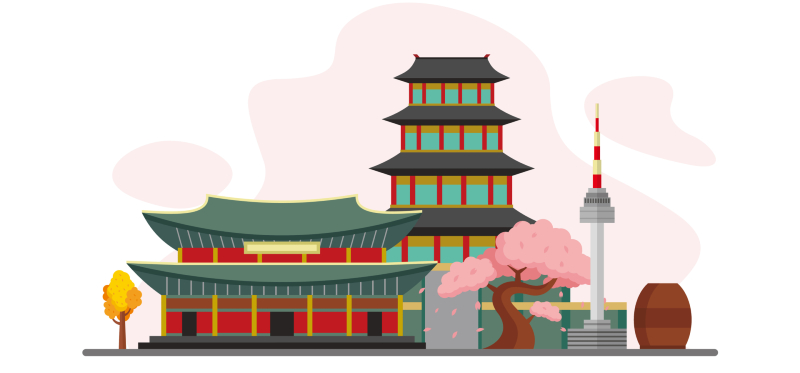
Introduction
When you are a B2B brand targeting the South Korean market, it is important to have a good understanding of the business culture there.
This will help you to do business in the smoothest, most effective and most respectful way – by being able to adapt to local customs and avoid any embarrassing faux pas.
In this blog post, I will explore the business culture in South Korea and how it differs from the West. The five categories I will cover are:
- Business attitudes in South Korea
- Communication styles in South Korea
- Meeting etiquette in South Korea
- Presentation methods in South Korea
- Marketing restrictions and regulations in South Korea
Let’s get straight into it!
1. Business attitudes in South Korea
In South Korea, there is a mixture of Confucian and military values. This is expressed in the way South Koreans value hierarchy and respect, with relationships being governed by very strict social rules regarding social status, rank, age, seniority, etc. Taking an appropriate attitude depending on these factors is crucial in business interactions.
Extending from this is also the fact that subordinates (lower-ranked employees) often feel quite intimidated by the idea of asking questions, because there is a fear that superiors might see questions as a challenge to their authority. Leadership in South Korea is not questioned. Subordinates may also worry that any questions might be seen as a sign of incompetence. So, when you are in a meeting with South Korean partners or clients, do not put them on the spot to ask a question, unless they are doing so voluntarily.
Another point to mention in this context is the fear of losing face. This applies not only to questions being asked but also to open discussions and debates involving anyone at any level. South Koreans care a lot about how they are perceived by others, so refrain from putting anyone in the spotlight, or worse, criticising anyone in front of others – for South Koreans, this would be considered an embarrassment.
Trust is paramount in South Korean negotiations and “inmaek” often plays a big part. Inmaek is a Korean word describing networks of social relationships based around one’s hometown, school, company, industry, hobby club, etc. Therefore, if you are targeting a South Korean partner or client, if you are able to approach them through an expert in the industry who already has a connection with them, that could be a great way to quickly build trust.
Be aware that the tasks and responsibilities of team members often overlap to a certain extent in South Korea. The good news is that this generally allows for smooth handovers and very little delays when there are absences on their side.
Furthermore, it is common in South Korea to work overtime until the very late hours or even into the weekend. When there is a lot of urgent work, people are pressured to not use their holidays or even cancel their booked holidays and return to work. With this being the norm in South Korea, be aware that your South Korean partners or clients might expect the same from you – or, in a worst-case scenario, may even blame any delays on your side for not dealing with matters urgently enough. If you foresee any tight deadlines or timelines, you should therefore be clear on your working hours from the get-go, in order to manage expectations.
Next, let’s touch on the concept of “bbali bbali”. This roughly translates as “quickly quickly” and refers to the fact that South Koreans love for things to be done quickly, with efficiency being highly valued. Sometimes, even when there are set rules or procedures to follow, South Koreans will quite freely break those, if they can find a more efficient way of doing something.
And finally, let’s talk about flexibility. South Koreans really value relationships, and they are also highly affected by the relationship. You will often see that their choices and decisions will change, depending on who they are talking to and what that person might prefer. This might seem inconsistent from a Western point of view, but it simply demonstrates South Koreans’ flexibility and willingness to change, depending on the relationship they have with the other person.
2. Communication styles in South Korea
There is an expectation in South Korea that people should be able to infer other people’s intentions. Because of this, South Koreans often use metaphorical language, expecting that the other person will be able to understand the point of the message from the given context. You will therefore hear them saying very frequently: “You know what I mean, right?” If you are ever unsure what they are talking about, use this opportunity to politely ask them to clarify.
For South Koreans, intention is regarded as very important, more so than actions. It is really common for South Koreans to share their feelings with others, to reveal the true intentions behind their actions. This means that they will highly appreciate it if you are honest with your business intentions and show recognition to their emotional positions throughout the business transaction.
Next, let’s turn to negative questions, such as: “Have you not eaten?” In the West, if you have eaten, you would answer “yes”, and if you have not eaten, you would answer “no”. But for South Koreans, that is not the case. Instead, the answer would align with the literal question, meaning that if someone asks: “Have you not eaten?”, if you have eaten, you would say “no”, and if you have not eaten, you would say “yes”. A lot of confusion arises from this difference, because when South Koreans learn to speak English, they carry this way of communicating into their English conversations. So, when you speak with them, it would be useful to answer any questions in full sentences, rather than just relying on “yes” or “no”, because they might take a “yes” or “no” to mean the polar opposite.
It is very important for listeners in South Korea to make gestures to show that they are following what the speaker is saying. South Koreans have very high self-esteem, so some would actually take it personally if they got the impression that you were not focused on what they were saying. The common gestures of acknowledgement are nodding and saying “mmm”.
When in a discussion, South Koreans do not particularly subscribe to the saying of “agree to disagree” – they want others to have the same opinions as themselves! When there are differences in ideas, instead of accepting these differences and agreeing to disagree, they will often try to persuade others to their way of thinking. So, when having a discussion or negotiation with South Korean partners or clients, try to go in prepared with plenty of facts and data, so that the best conclusion can be arrived at quite naturally. South Koreans love data.
And finally, whilst English may be used in business in South Korea, it is not a dominant language and they are not really fully comfortable with it. Having your presentations translated into Korean and using interpreters would therefore be a welcome show of respect. If you attempt to learn a few phrases in Korean, be mindful that the Korean language has various levels of formality, so using the appropriate level based on the person’s age and position is important.
3. Meeting etiquette in South Korea
In a business context, the common ways of saying “hello” are with a handshake or a bow (a slight bending of the waist, not just a bow at the neck). If you are shaking hands, the more senior person needs to initiate it. If you are having a meeting online, you can remain seated and a casual bow of the neck would be appreciated.
Exchanging business cards is a form of ritual in South Korea. You need to accept and offer the business cards with both hands and with a slight bow, and then you need to take a moment to examine it. This is to show respect.
Punctuality is an interesting point. It may be a bit unfair, but the higher and more powerful a person’s position is, the less important it is that they are on time. It is considered totally acceptable for management to be late to a meeting, but not the lower-ranked employees. Nevertheless, if you arrive late to a meeting in South Korea, this will generally pass without comment, but there is an assumption that you had a really good reason, and after the meeting, you have to be ready to be questioned on what that reason was.
And finally, with regards to dress code, business attire varies, but generally a conservative, formal approach is appreciated.
4. Presentation methods in South Korea
In South Korea, images and videos are favoured over text. This is apparent on Naver, a popular search portal created in South Korea for South Koreans, which is very visual-heavy compared to Google.
As I briefly mentioned earlier, South Koreans are highly data-driven, so it is important to include infographics, charts and tables in your presentations and reports. That will resonate very well with them.
And finally, be aware that, traditionally, different colours have represented different things, some positive and some negative. However, in modern-day South Korea, there are no colours that you definitely need to avoid. For example, whereas black traditionally represented death, nowadays it can actually be a symbol of elegance. If you are creating visual content targeting South Koreans, make sure to consult with a South Korean native who can advise on what colours can bring the best results.
5. Marketing restrictions and regulations in South Korea
When you want to conduct marketing activities in South Korea, be aware that industry-specific regulations mean that businesses from certain industries will be required to jump through extra hoops and submit additional documents. This list of industries is not static and depends largely on the platform you want to do marketing on. Do not be discouraged though. If you follow the instructions you are given and submit the documents you are asked for, normally at the end of the process you will be able to open your account and conduct your marketing activities. If you are unsure, check with the platform first, to get an idea of what to expect.
Be aware that it will be much easier to advertise on online platforms in South Korea if you establish a local presence, because there are limitations on what you can do as a foreign entity. Whether you open your own local branch or enter into a partnership with a local company, it will help greatly to have that local presence. Whenever possible, it is recommended to have a local office with local employees.
And finally, a fully localised website is almost non-negotiable. This involves more than just translating your English website. Invest in proper localisation that is completely tailored to your South Korean audience.
Conclusion
I hope this blog post has given you a useful overview of the B2B business culture in South Korea and how it differs from the West. If you follow the tips given in this blog post and are respectful of the local customs, you will be well on your way to doing business with your South Korean partners and clients in a smooth and effective way – good luck!
Want to learn more?
This blog post is based on a webinar co-presented by my colleagues Sivan Hu, Daiana Damacus and Jungmin Park about how B2B brands should adapt culturally when targeting China, Japan and South Korea respectively. You can watch the webinar recording here.
Need support with doing business in South Korea?
Our international digital marketing experts are experienced in the South Korean market. If you need consultancy or support for targeting South Korea, just get in touch with us today and one of our friendly team members will get back to you.







